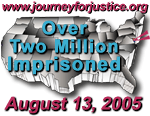 Scheduling a Private
Meeting Scheduling a Private
Meeting
By Chuck Armsbury, editor and program development for November
Coalition; regular Journey for Justice participant
You may want a private meeting with us, and perhaps as part
of a series of meetings while we're in your area. This may mean
you'll be inviting some close friends to your house, or meeting
at a restaurant, maybe a park if the weather is agreeable.
In other fashion, you might also want to have us meet privately
with public officials for an off-the-record discussion about
drug policy and the drug war. It might be a society of treatment
professionals, or a small ladies' club. The public isn't invited.
Last winter, a middle-aged couple with a son in prison invited
us into their home to meet and talk with two friends, people
they've known since childhood. We helped them explain the issue
of the drug war and mass imprisonment to these people, varied
in background, in attendance mostly because they cared about
the couple we knew, too.
A private meeting has distinct advantages for everyone. Unlike
a public discussion, private meetings won't include media representatives
and publicity. In the comfort of a living room it is often easier
to ask questions one would hesitate to ask in public. Likewise,
as in one small town, a private meeting of public officials guaranteed
that we heard some honest, if sometimes critical, comments about
the Journey for Justice mission. Where we go, people don't always
agree with us.
Intimate meetings do provide a quality of learning for everyone
not always attainable in large, public gatherings -- a truth
well known in the teaching profession.
Another example of a successful private meeting is a dinner
party where local activists can meet and visit with us. At another
private meeting spring of 2003, our hosts invited various to
dinner -- young activists who feed hungry families in an urban
southern town, a labor organizer, a feminist, and a physician.
Each of us had ample opportunity to share stories and experience
with each other. It's during such times that everyone gains in
understanding about how issues are linked and interact.
At another private meeting our hosts had invited sentencing
reform activists from other groups whose missions overlap or
harmonize with ours.
If you think you want to have a private meeting with us, remember
that we're meeting with you about the issue of failed drug policy
and the destructive drug war. We're hoping, of course, that from
this first private meeting you will gain in confidence and interest
in putting together a public discussion when we visit your area
again.

|









